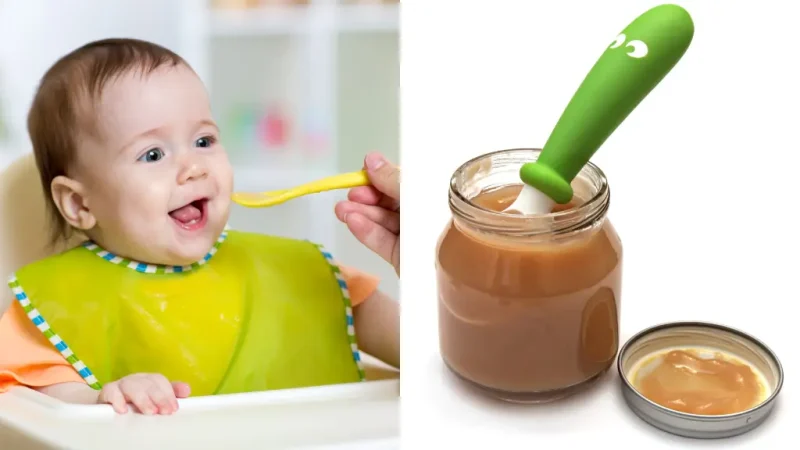Does Gerber baby food have heavy metals? This question has been causing concern among parents and caregivers lately, and for good reason. Recent studies have highlighted a troubling issue in the baby food industry.
Gerber baby food products have been found to contain high levels of heavy metals. This revelation worried many parents about their children’s health and safety.

In this article, we’ll dive deep into the issue of heavy metals in Gerber baby food. We’ll explore what this means for your little ones, why it’s happening, and what you can do to protect your child’s health. Let’s uncover the truth behind this alarming discovery.
The Not-So-Sweet Truth About Gerber Baby Food
Alright, let’s get to the point. Recent studies have shown that Gerber baby food products contain high heavy metals.
I know – it’s enough to make any parent’s heart skip a beat. But before we panic, let’s break this down and understand what it really means for our little ones.
What Are Heavy Metals, Anyway?
First, what exactly are we talking about when we say “heavy metals”? Well, these aren’t the headbanging tunes you might have rocked out to in your younger days.
We’re discussing elements like lead, arsenic, cadmium, and mercury. These metals occur naturally in our environment but can be seriously harmful if they build up in our bodies—especially in our precious children’s developing bodies and brains.
The Gerber Situation: A Closer Look
Now, let’s focus on Gerber. This brand has been a household name for generations, and many of us probably ate Gerber food as babies.
So it’s pretty shocking to learn that their products have been found to contain these potentially dangerous substances.
The Study That Spilled the Beans
In 2021, a congressional report dropped a bombshell: many leading baby food brands, including Gerber, were found to have “dangerously high” levels of toxic heavy metals in their products. We’re talking about things like:
- Arsenic: Up to 91 times the maximum level
- Lead: Up to 177 times the maximum level
- Cadmium: Up to 69 times the maximum level
- Mercury: Up to 5 times the maximum level
I don’t know about you, but those numbers spin my head!
Why Should We Care About Heavy Metals in Baby Food?
You might wonder, “Okay, so heavy metals are in the food. But why is this such a big deal?” Great question! Let’s break it down.
The Impact on Developing Brains
Our little ones’ brains are like sponges, soaking up everything around them as they grow and develop.
Unfortunately, heavy metals can interfere with this crucial process. Exposure to these toxins has been linked to:
- Lower IQ scores
- Attention deficit disorders
- Behavioral problems
- Learning difficulties
And that’s just the tip of the iceberg. The long-term effects of early exposure to heavy metals are still being studied, but the potential risks are seriously concerning.
It’s Not Just About the Brain
While the brain is a major concern, heavy metals can affect other body parts too. They’ve been associated with:
- Kidney damage
- Impaired growth
- Weakened immune systems
- Increased risk of certain cancers later in life
These metals are unwanted guests at a party, causing chaos wherever they go in our kids’ bodies.
How Did Heavy Metals End Up in Gerber Baby Food?
You might think, “Surely Gerber didn’t just decide to throw some heavy metals into their recipes, right?” And you’d be correct. The story of how these metals ended up in baby food is a bit more complicated.
It Starts with the Soil
Heavy metals are naturally present in soil and water. They’ve been there for, well, pretty much forever.
However, human activities like mining, industrial processes, and using certain pesticides have increased their concentrations in some areas.
From Farm to Formula
When crops are grown in soil containing these metals, they can absorb them as they grow. This means that even organic, all-natural ingredients can contain trace amounts of heavy metals.
The plants are unwittingly playing a game of “pass it on” with these unwanted elements.
Processing Predicament
In some cases, the food processing methods used by companies like Gerber might actually concentrate these metals.
For example, when fruits or vegetables are turned into purees, the water content is reduced, which can increase the concentration of any metals present.
How Much Is Too Much?
Here’s where things get a bit tricky. There’s no clear consensus on what levels of heavy metals are “safe” in baby food.
The FDA has set limits for some metals in bottled water and other products, but baby food? It’s been flying under the radar.
The Current Lack of Regulation
Believe it or not, no federal standards exist for heavy metals in baby food. It’s like we’ve been playing a game without any rules!
This lack of regulation has allowed companies like Gerber to sell products with levels of heavy metals that many experts consider dangerous.
Comparing Apples to Arsenic
Let’s look at arsenic as an example to give you an idea of how serious this is. The FDA has set a limit of 10 parts per billion (ppb) for arsenic in bottled water.
Sounds pretty low, right? Well, some Gerber products contained up to 90 ppb of arsenic. That’s nine times the level considered safe in water!
What’s Gerber Saying About All This?
You’d think that with all this buzz, Gerber would scramble to explain themselves, right? Well, their response has been… interesting, to say the least.
The Official Gerber Statement
Gerber has maintained that its products are safe and have strict quality control measures.
They’ve stated that they test their ingredients and final products for heavy metals and other contaminants.
Reading Between the Lines
But here’s the thing: while Gerber says they test for these metals, they haven’t denied that their products contain them. It’s like saying, “Yes, there’s an elephant in the room, but don’t worry—we measured it!”
What Can Parents Do to Protect Their Little Ones?
Alright, so we’ve covered the bad news. But don’t despair! We can take steps to minimize our babies’ exposure to these harmful metals.
Diversify, Diversify, Diversify
One of the best things you can do is offer your baby various foods. Don’t rely too heavily on any one type of food or brand. It’s like creating a diverse investment portfolio for your baby’s diet!
Go Fresh When Possible
While it’s not always practical, preparing your baby’s food using fresh ingredients can help reduce exposure to heavy metals. Plus, it’s a great way to know exactly what’s going into your little one’s tummy.
Read Labels Like a Detective
When buying packaged baby food, become a label detective. Look for products that have been tested for heavy metals and meet stricter standards than those required by law.
Avoid High-Risk Ingredients
Some ingredients are more likely to contain high levels of heavy metals. These include:
- Rice (especially brown rice)
- Sweet potatoes
- Carrots
- Fruit juices
This doesn’t mean you need to eliminate them entirely, but limiting them can help reduce overall exposure.
The Bigger Picture: What Needs to Change?
While we can take steps as individuals, this issue really calls for change on a larger scale.
Pushing for Regulation
We need clear, enforceable standards for heavy metals in baby food. It’s time for the FDA to step up and set limits that protect our most vulnerable consumers.
Demanding Transparency from Companies
Companies like Gerber should be required to test their products and make the results public regularly. No more hiding behind vague statements about food safety!
Supporting Sustainable Farming Practices
In the long run, we need to address the root of the problem: contaminated soil. Supporting sustainable farming practices that reduce soil pollution can help ensure safer food for future generations.
The Bottom Line: Knowledge is Power
So, does Gerber baby food have heavy metals? Unfortunately, the answer is yes. But now that we know this, we’re not helpless.
By staying informed, making smart choices, and pushing for change, we can help protect our little ones from these hidden dangers.
Remember, being a parent is tough enough without worrying about invisible toxins in our kids’ food.
